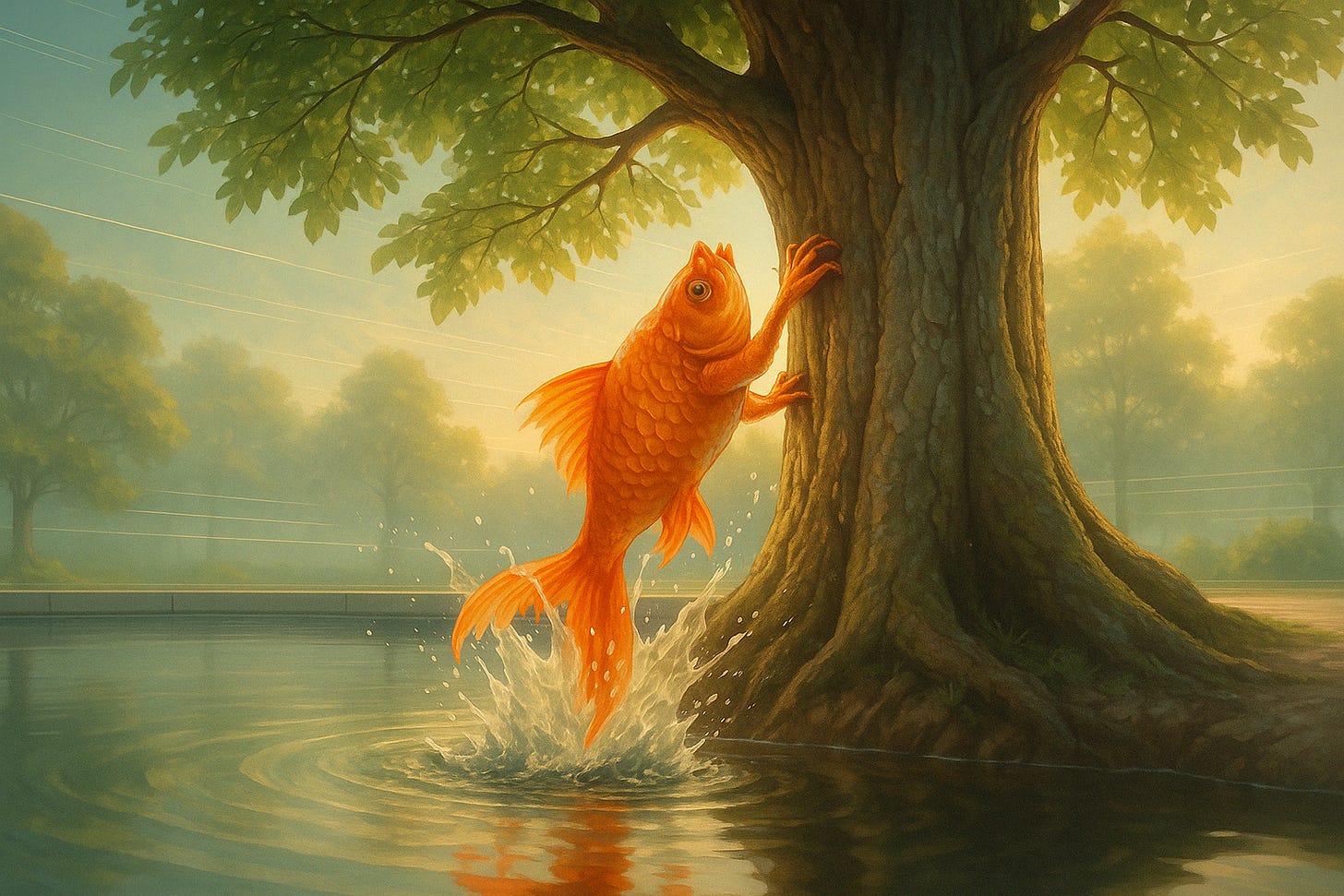Are You Asking a Fish to Climb a Tree?
The Bane of Diversity
Welcome to Polymathic Being, a place to explore counterintuitive insights across multiple domains. These essays explore common topics from different perspectives and disciplines to uncover unique insights and solutions.
Today's topic dives deep into the challenges of diversity. We’ll examine the idea of judging a fish by its ability to climb a tree and consider how many aspects of life impose artificial expectations that prioritize climbing a tree as the only valuable outcome. Finally, we’ll explore some insights for embracing true diversity, even when it’s uncomfortable, so that you can unlock exceptional outcomes.
Intro
In a lot of ways, I’m a fish. That’s not just because I have a tendency to not blink as much as the average person. (which, apparently, when people learn this tidbit and start noticing, it weirds them out!) It’s also not because I’m cold or clinical in my demeanor. It’s because I’ve never quite fit in the way so many other people do.
Let’s be honest, a polymathic mindset that embraces systems thinking and intentionally reframes problems to pull out counterintuitive insights is the selling point of Polymathic Being because it’s not common. We also ruffle feathers when we challenge the status quo because Sacred Cows do make the best burgers after all.
Yet there’s more to that. It’s like the story that was first identified in 1898 in The Journal of Education, which has been updated and simplified, and then attributed to Einstein, who never said it, but for the sake of this essay, let’s just go with the idea:
“Everybody is a genius. But if you judge a fish by its ability to climb a tree, it will live its whole life believing that it is stupid” - Not Einstein
I’m a fish who's often been expected to climb a tree, and that’s created waves that have caused me troubles throughout my career. My status as a fish was highlighted at a recent threatcasting event where a wonderful fellow, Brian David Johnson, one of the big brains behind Applied Futures, looked at me and said:
“You must be terrible to manage… And I mean that in a good way, but… How did you survive corporate America?”
Well, let’s just say I have enough knife wounds in my back to attest, my survival wasn’t due to a lack of leadership trying to pound my nail down, or trying to round my corners to fit in a pigeon hole. My response captures the essence of it well.
“I am terrible to manage if by manage you mean expecting me to think, act, and speak like everyone else. Just ensure I understand the goal, and let me go, and you’ll typically enjoy unexpected results.”
I’m not trying to toot my own horn. I’m a fish that’s often expected to climb a tree as well as any monkey, and that has created a lot of challenges for me. I even used that analogy with a manager I had. He complained that I was making waves, splashing around too much, and that I was disruptive. When I shared that I was trying my damndest to climb the tree, and that I was better suited to tackle the problem differently, he told me that I should keep trying to climb the tree and not dare deviate.
The Bane of Diversity
This is the bane of many diversity initiatives at large companies. Namely, they want the superficial diversity, but they don’t like the true diversity of different ways of thinking and doing. I experienced this as a manager of a very diverse engineering team. I had 16 young engineers who were more than 50% female and more than 60% non-white. I had both Jesus and Muhammad on my team, along with other diverse individuals that everyone says they want.
But HR didn’t like it one bit. That’s because diversity means difference, and difference results in conflict. What I mean is that we expect from each other what we expect from ourselves, and if we are all different, that’s not going to be easy. True diversity actually requires conflict, and that conflict is refining because it highlights what each of us uniquely needs.
Just consider the Tuckman Model for team dynamics. There are four stages:1
Forming - initial acquaintance and orientation
Storming - conflict and resistance
Norming - cohesion and shared goals
Performing - high-functioning and productive
Let’s look at step 2 again: Storming. This is where the rubber meets the road in terms of diversity. This is where the true power of diversity also comes into play. The root is the Latin word "diversus", meaning "various" or "different.” Different people have different views, ways of thinking, and expectations. Too often, we treat others how we want to be treated, forgetting that they aren’t us and that may not be how they want to be treated. As a team works out those idiosyncrasies, it requires conflict, and that conflict is called storming.
Put another way, I’ve met a ton of teams who claim they're at the performing stage and brag about skipping the storming. That can only happen if there’s no diversity or, more likely, you’ve forced an expected compliance, shoved everything into the background, and never actually got the team out of the storming phase at all!
I’m a fish. If I’m on a team with Monkeys, there’s going to be storming. If you tell me I’m graded by how well I climb a tree and that’s the only thing you’ll accept, I’ll try, I’ll swim super hard, and jump. I’ll try to build a fish ladder to get up there, but I will make waves. If you try to avoid those waves and refuse to allow the norming of unique differences, you’ll never get a performing team.
Also, if you expect me to think like everyone else, I won't be happy, and I also won't perform as you want me to. You’re also not going to be happy because I won't do it the way you would. You’re also not going to get the diversity of thought and outcome you were hoping for because you are demanding compliance to something else.
A Solution
So what do we do about this? If you talk to a few of my previous managers, they’d recommend a fish fry. However, if you speak to a few others, the ones who saw, understood, and respected that I was a fish… well. I can do things that any old monkey cannot. It’s these latter leaders that I’ve studied the hardest to try to emulate.
First off, I don’t try to manage anyone. My goal is to support, develop, and unlock their strengths. I provide them with Direction, Energy, and Proactive Accountability, and then observe and learn to see how they approach the problem and solution. I strive to guide and mentor, rather than direct and demand.
Even more so, I don’t want them to think like me. I want them to teach me how they think, so I can utilize their skills to the best of my ability. My biggest weakness is when I’m surrounded by people like me. My greatest strength is bolstering my abilities with the unique strengths of others. This is not easy, so let’s break down a few topics we’ve looked at before as a starting point.
Investigating Personality Proclivities - Understanding yourself and others is essential. Recognize that not everyone is like you and that each of us has different strengths and weaknesses. Don’t judge someone by their weakness. Leverage their strengths instead.
Embrace the Divergents - If you look around and only see people like you… That’s a problem. It’s certainly easier to have groupthink, and it's a lot harder to manage differences, but this is where true creativity and innovation often lie.
Born or Trained - If you’re a leader, recognize that you can lead from any point or position. However, also understand that what comes easily to you may be hard for others, and vice versa. Don’t view natural leaders as a threat. Embrace them, learn from them, and, most importantly, let them help you!
These are just three steps to begin embracing true diversity. Even those damned fish who are terrible to manage. Because once you stop demanding a fish climb a tree, you might find that they’re the perfect person to break down the real dam that’s blocking the progress of your team.
Did you enjoy this post? If so, please hit the ❤️ button above or below. This will help more people discover Substacks like this one, which is great. Also, please share here or in your network to help us grow.
Polymathic Being is a reader-supported publication. Becoming a paid member keeps these essays open for everyone. Hurry and grab 20% off an annual subscription. That’s $24 a year or $2 a month. It’s just 50¢ an essay and makes a big difference.
Further Reading from Authors I Appreciate
I highly recommend the following Substacks for their great content and complementary explorations of topics that Polymathic Being shares.
Goatfury Writes All-around great daily essays
Never Stop Learning Insightful Life Tips and Tricks
Cyborgs Writing Highly useful insights into using AI for writing
Educating AI Integrating AI into education
Socratic State of Mind Powerful insights to the philosophy of agency
They’ve also added Adjourning: dissolution of the team. The main point to remember is that any time anything or anyone changes on the team, you go straight back to Forming and if you think you don’t, you’ll always be in Storming.









I was wondering when you were going to tell us what the fish could do… and breaking the dam is the perfect analogy. Maybe the monkeys climbing the tree were trying to see far and wide what the problem was, but we’re not able to see under the water where the true problem was. Interesting how water is also mythologically used as chaos, creativity, and potential. Keep breaking dams so the water flows clear!
Nailed it!